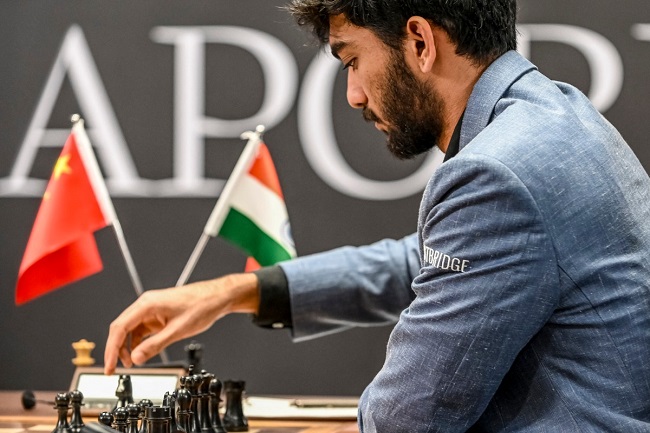Crowning a Prodigy: Gukesh Dommaraju Becomes the Youngest Classical Chess World Champion at 18

In a dazzling display of intellect, determination, and composure, Gukesh Dommaraju etched his name into chess history by becoming the youngest-ever undisputed classical chess world champion at just 18 years old. The prodigy defeated reigning champion Ding Liren in a nail-biting best-of-14 final held in Singapore on Thursday, sealing his triumph with a narrow 7.5-6.5 victory.

The match had been a masterclass in strategy and mental fortitude, with the two competitors locked at 6.5 points each heading into the final game. The tension in the room was palpable as fans worldwide anticipated a tiebreak showdown. But Gukesh, with the poise of a seasoned veteran, seized the moment when Ding made an uncharacteristic blunder. In a matter of moves, Gukesh delivered the decisive point, shattering records and expectations in one unforgettable stroke.
The Moment of Glory
As the final move was played and victory became inevitable, Gukesh’s emotions overwhelmed him. The usually stoic teenager broke into tears, the weight of his accomplishment washing over him like a tidal wave. Across the board, Ding Liren sat frozen, his head in his hands, grappling with the bitter sting of defeat.
The young champion’s reaction was a raw and poignant reminder of the human element behind the mental warfare of chess. Gukesh’s tears symbolized years of grueling practice, relentless focus, and the sacrifices required to ascend to the pinnacle of the chess world at such a tender age.
A Journey of Genius
Gukesh’s meteoric rise to the top has been nothing short of extraordinary. Born in Chennai, India, a city known as the “chess capital of India,” Gukesh demonstrated an uncanny aptitude for the game from an early age. He earned his Grandmaster title at the age of 12, making him the second-youngest Grandmaster in history at the time.
His journey to the world championship was marked by relentless hard work, guided by a hunger to not only compete but also redefine the boundaries of the game. His victory is seen as a testament to the golden age of Indian chess, which has been bolstered by legends like Viswanathan Anand, whom Gukesh credits as a major inspiration.
Speaking to the press after his historic win, Gukesh said, “This moment is the culmination of a dream I’ve chased for as long as I can remember. To play against a champion like Ding and come out on top is an honor I will cherish forever.”

Ding Liren: A Worthy Opponent
Defending champion Ding Liren, who became China’s first-ever world chess champion earlier this year, fought valiantly throughout the final. Known for his deep preparation and solid play, Ding was expected to push Gukesh to rapid tiebreaks, where his vast experience might have given him an edge.
However, a rare error in the final game proved costly, underscoring the unforgiving nature of classical chess at the highest level. Despite the loss, Ding remains a towering figure in the sport, and his gracious acknowledgment of Gukesh’s brilliance earned him admiration from fans and analysts alike.
A New Era in Chess
Gukesh’s victory signals a seismic shift in the chess world. By dethroning Ding, the teenager has not only claimed the title but also announced the arrival of a new generation of players who are redefining the sport.
His success adds to India’s growing prominence in the global chess arena. With players like Gukesh, Rameshbabu Praggnanandhaa, and Nihal Sarin making waves internationally, India is poised to dominate the chess landscape for years to come.
Prominent chess analyst and Grandmaster Susan Polgar described Gukesh’s triumph as “the dawn of a new era.” She added, “What sets Gukesh apart is his unshakable focus, his willingness to take risks, and his ability to learn and adapt at lightning speed. He’s not just a player of the future—he’s the player of the present.”
What Lies Ahead?
As Gukesh basks in his hard-earned victory, the chess world is already speculating about what’s next for the teenage champion. Will he cement his dominance with multiple titles, or will the fiercely competitive nature of modern chess present fresh challenges?
One thing is certain: Gukesh’s story has captured the imagination of millions. From young aspiring chess players in India to seasoned professionals worldwide, his achievement is a beacon of inspiration, proving that age is no barrier to greatness.
As Gukesh stood on the podium in Singapore, clutching the championship trophy with tears still glistening in his eyes, it wasn’t just a victory for him—it was a victory for passion, perseverance, and the timeless allure of the game of kings.




